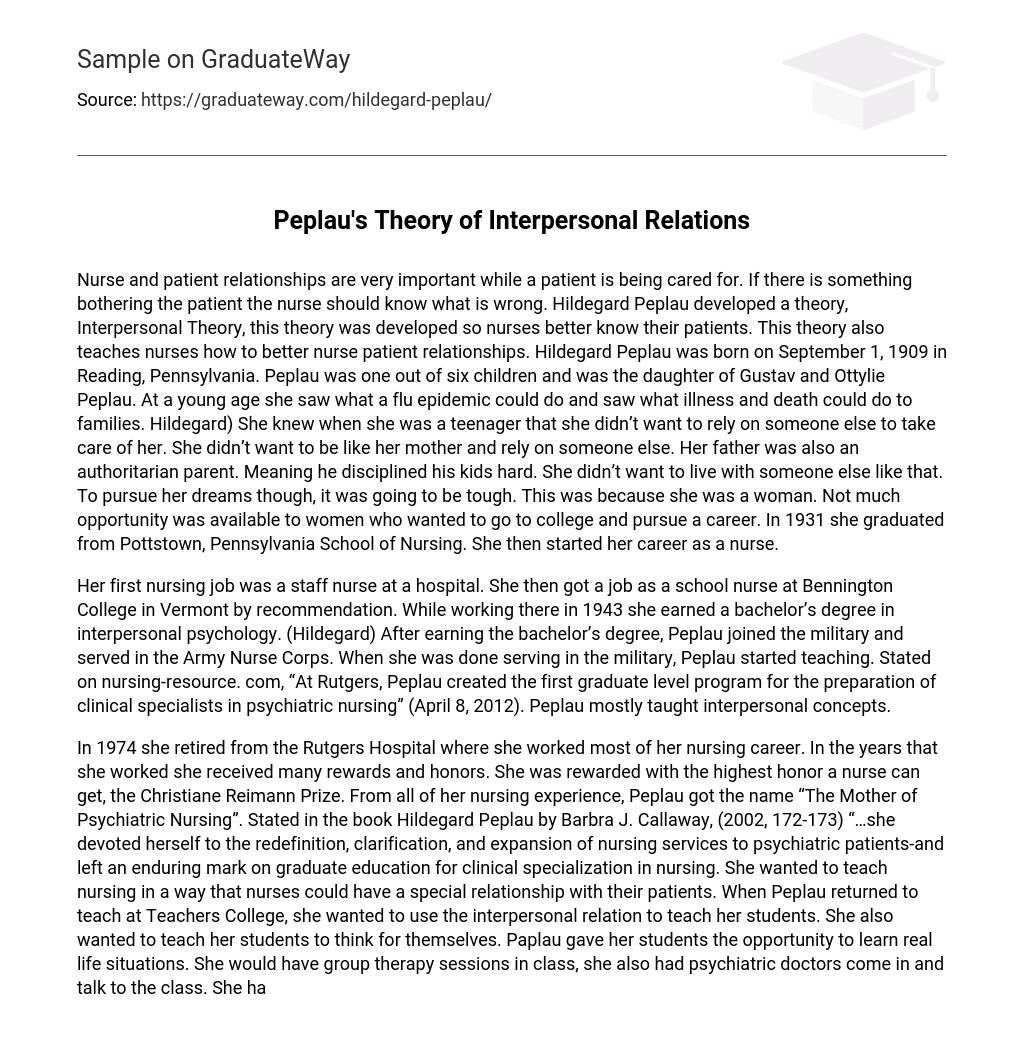Hildegard Peplau developed the Interpersonal Theory to enhance nurses’ understanding of their patients and improve nurse-patient relationships. These relationships are crucial for patient care, so it is important for nurses to be aware of any issues troubling the patient.
Peplau was born on September 1, 1909, in Reading, Pennsylvania. She grew up seeing how a flu epidemic affected families and experiencing the consequences of illness and death. As a teenager, she decided not to rely on others for her well-being and drew inspiration from her mother’s dependence on someone else and her authoritarian father. However, as a woman pursuing her dreams, she faced challenges because of limited educational opportunities and career advancement possibilities.
In 1931, Peplau graduated from the Pottstown School of Nursing in Pennsylvania, marking the start of her nursing career.
Starting as a staff nurse at a hospital, she later became a school nurse at Bennington College in Vermont. In 1943, she earned her bachelor’s degree in interpersonal psychology through a recommendation while working there. After obtaining her degree, Peplau joined the Army Nurse Corps and served in the military. Following her military service, Peplau began teaching and created Rutgers University’s first graduate-level program for clinical specialists in psychiatric nursing. During her career, she emphasized imparting interpersonal concepts.
In 1974, after spending most of her nursing career at Rutgers Hospital, she retired and received numerous rewards and honors. Among these honors was the prestigious Christiane Reimann Prize, the highest honor a nurse can receive. Peplau earned the nickname “The Mother of Psychiatric Nursing” due to her extensive nursing experience.
According to Barbra J. Callaway’s book “Hildegard Peplau” (2002, 172-173), Peplau dedicated herself to redefining, clarifying, and expanding nursing services for psychiatric patients. She left a lasting impact on graduate education in nursing by emphasizing the importance of establishing special relationships between nurses and their patients. When she returned to Teachers College as a teacher, Peplau aimed to use interpersonal relationships as a teaching method. She also encouraged her students to think independently and provided them with opportunities to learn through real-life situations.
In her classes, Peplau incorporated group therapy sessions and invited psychiatric doctors to speak. Students were assigned roles as patients, doctors, and nurses to further enhance their understanding of different perspectives.
Paplau scheduled clinicals at Brooklyn State Hospital in order to provide her students with a comprehensive understanding of the healthcare industry and an appreciation for patients’ perspectives. These clinicals consisted of assigning students to individuals with complex psychiatric conditions, with the goal of acquainting them with the challenges faced by medical professionals and emphasizing the importance of caring for patients. As stated by Callaway (2002), each student was required to dedicate one hour per week over a span of two weeks to their assigned patient throughout the course of a year.
Eventually, the patients at the facility began showing signs of increased awareness and ability to perform tasks such as self-feeding and bathing. The attendants informed the doctors about these changes, but the doctors dismissed them as mere superficial improvements that did not indicate any actual progress in the patients’ mental condition (Callaway, 2002, 172-173). Contrary to this perspective, Peplau argued that there were indeed positive transformations occurring. To aid in their recovery, she utilized psychotherapy. The development of interpersonal theory can be traced back to Harry Sullivan in the 1930s when he established it with the objective of supporting individuals with mental illnesses.
Interpersonal psychotherapy, created by Gerald Klerman in 2009, is an alternative to medication for individuals with mental illnesses such as depression and schizophrenia. Its main goal is to enhance social and interpersonal functioning in order to relieve symptoms (Sloan, 2009).
The goal of this therapy was to aid patients with mental illnesses who did not have success with medication. The approach involved creating bonds between patients and their healthcare providers that were customized to meet individual needs and support the management of their mental illnesses. The use of the interpersonal theory has a broad scope and is particularly beneficial for individuals dealing with conditions like depression, schizophrenia, eating disorders, and others. While it may not offer a permanent resolution, its effect is significant.
According to Willow Wisp on eHow (April 10, 2012), Peplau’s theory highlights the significance of the interaction between patients and healthcare professionals, such as doctors, nurses, therapists, and counselors. This interaction is crucial in helping patients overcome their individual challenges. The simple act of having someone to confide in can have a profound effect. Peplau’s theory involves employing different nursing roles – stranger, teacher, resource manager, counselor, surrogate, and leader – to assist patients in forming a bond with their nurses.
There are also secondary roles as well, such as being a tutor, researcher, mediator, technical expert, and safety manager (Wisp, April 10, 2012). Additionally, Peplau incorporated phases of process from her theory. These phases include orientation, identification, exploitation, and resolution. Throughout these stages, the nurse aims to establish a connection with the patient and determine their mental state. If the nurse successfully completes the identification and exploitation phases, they then proceed to finding a resolution.
Nurses rely on the interpersonal theory in their daily practice, as they are the ones who have most contact with patients and possess the deepest understanding of them compared to other medical staff. This theory allows patients to improve without solely relying on medication. By partnering with nurses, patients can develop the ability to seek support from others. The interpersonal theory has made significant progress and will remain an integral part of healthcare professionals’ toolkit. It is important to recognize that medication is not always the solution; simply providing presence and support for the patient can be immensely beneficial.





